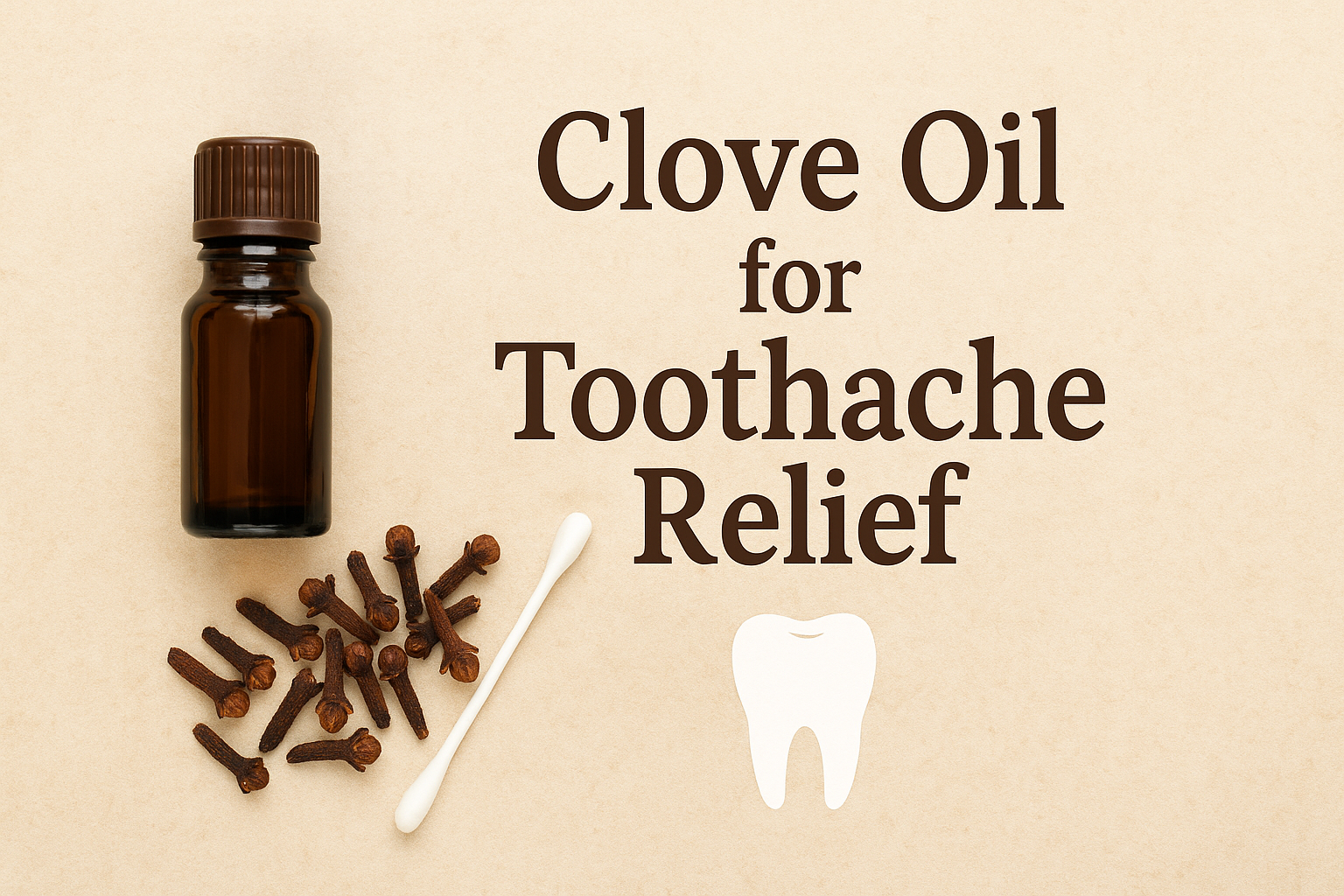Introduction: Nature’s Tiny Powerhouse for Tooth Pain
A throbbing toothache can turn even the calmest day into a painful ordeal. But before you reach for strong painkillers, nature offers a tried-and-true solution — clove oil, a powerful essential oil known for its analgesic and antiseptic properties.
Used for centuries in Ayurveda and aromatherapy, clove oil (Laung ka tel in Hindi) is one of the most potent natural remedies for toothache, gum infections, and oral inflammation. Rich in eugenol, an active compound with natural anesthetic and antibacterial effects, clove oil helps numb pain, fight bacteria, and soothe swollen gums within minutes.
In this guide, you’ll learn how to use clove oil for toothache relief safely and effectively — plus expert tips to maximize its healing power.
Why Clove Oil Works for Toothache Relief
Clove oil’s effectiveness lies in its primary active compound — Eugenol, which is both a natural anesthetic and antiseptic.
Scientific and Ayurvedic insights:
- Eugenol blocks pain signals by numbing nerve endings.
- Its antibacterial action eliminates oral pathogens causing infection.
- Its anti-inflammatory properties soothe gum swelling and redness.
- From an Ayurvedic view, it balances Kapha dosha, which often causes heaviness and buildup in the mouth and gums.
Clove oil doesn’t just relieve pain — it supports long-term oral health when used mindfully.
How to Use Clove Oil for Toothache Relief (Step-by-Step Guide)
Step 1: Gather Your Supplies
You’ll need:
- 2–3 drops of pure clove essential oil
- 1 tsp of carrier oil (like coconut or olive oil)
- A cotton ball or clean earbud
Tip: Never use undiluted clove oil directly on gums or teeth — it can cause irritation.
Step 2: Prepare the Mixture
- Mix 2–3 drops of clove oil with 1 teaspoon of carrier oil.
- Stir well to create a mild, safe blend.
Step 3: Apply to the Affected Tooth
- Soak a cotton ball in the diluted oil blend.
- Gently press it on the painful tooth or gum area for 10–15 minutes.
- Repeat 2–3 times daily for relief.
Alternate method: Add 1 drop of diluted clove oil to warm water and use it as a mild mouth rinse.
Step 4: Inhale for Additional Relief (Aromatherapy Technique)
For stress-related tooth or jaw tension, inhale clove oil vapors:
- Add a few drops to a diffuser or bowl of hot water.
- Breathe deeply for 5–7 minutes.
This calms both nerves and pain perception — a holistic aromatherapy touch.
Additional Natural Remedies to Pair with Clove Oil
For complete oral care and enhanced pain relief:
- Salt water gargle: Reduces inflammation and cleanses bacteria.
- Cold compress: Numbs external jaw pain and swelling.
- Turmeric paste: Natural antiseptic for gum infections.
Combine these with clove oil therapy for faster, balanced healing.
Safety Tips and Precautions
While clove oil is highly effective, it must be used with care.
- Always dilute before applying to the skin or gums.
- Avoid swallowing clove oil directly.
- For children and pregnant women, consult a dentist or aromatherapist first.
- If pain persists for more than 2 days, seek medical evaluation — clove oil offers relief but not a permanent cure for severe infections.
Conclusion: A Drop of Nature’s Wisdom for Toothache Relief
With its powerful blend of pain relief, antibacterial action, and aromatic calm, clove oil stands as one of the most effective natural remedies for toothache. It bridges the wisdom of Ayurveda and modern aromatherapy — offering quick comfort without harsh chemicals.
By learning how to use clove oil for toothache relief, you’re embracing nature’s gentle yet potent healing system — one drop at a time.
Let the warmth of clove ease your pain, restore your smile, and remind you that nature truly knows best.
FAQs Section
How long does clove oil take to relieve tooth pain?
Usually within 5–10 minutes of application, though relief duration varies depending on severity.
Can I apply clove oil directly to my tooth?
No, always dilute it with a carrier oil to prevent irritation or burns.
Is clove oil safe for children?
In very small, diluted quantities under adult supervision — yes. Consult a pediatric dentist before use.
Can clove oil help with gum infection or swelling?
Yes. Its antibacterial and anti-inflammatory properties help soothe swollen gums and fight infection.
How often can I use clove oil for toothache?
2–3 times daily until the pain subsides. For chronic pain, consult a dentist for evaluation.

